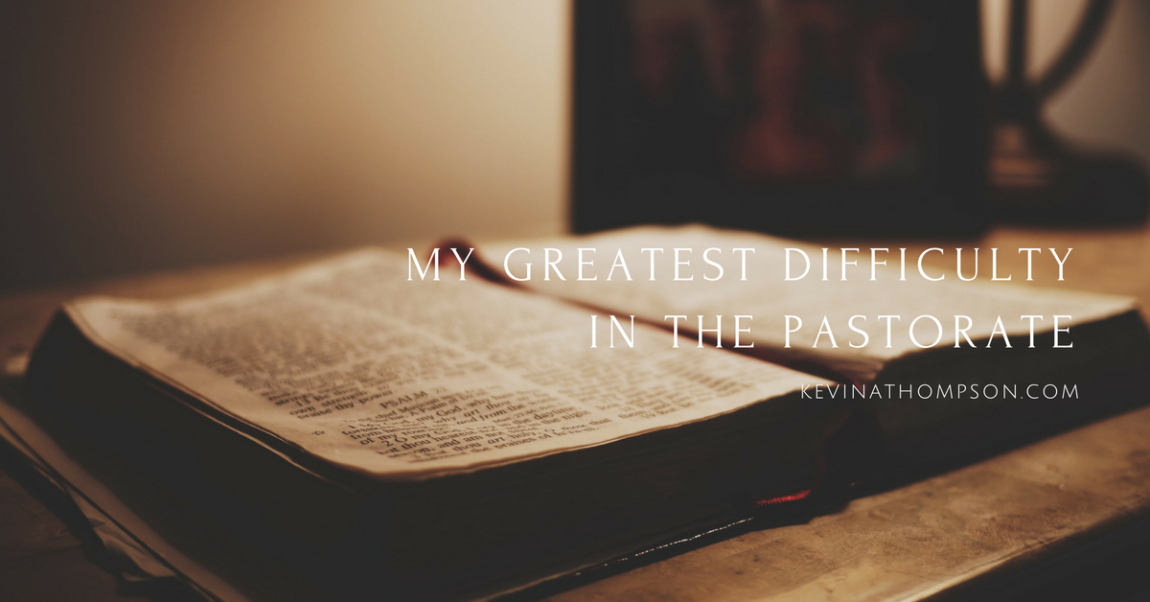The pastorate is far more privilege than it is problem. It’s a great gift to spend a good amount of time studying Scripture, serving others, and stratagizing how to promote the greater good. I’m often amazed not just with the diversity of people in which the pastorate puts me in contact with, but also with the amount of love that the community shows to me and my family on a regular basis.
It’s not unusual on a weekly basis for someone to:
- anonymously buy me lunch
- send an encouraging note/email
- tell me a story of how their life is changing for the better
- drop by just to tell me of how God is at work
The pastorate is a privilege. (See: 3 Things that Exhaust a Pastor)
Yet, it does have its challenges. I jokingly say, the good news is that I have a few thousand people who love me, the bad news is I have to love a few thousand people. Like a few other vocations, the pastorate is filled with heart-ache, frustrations, and occasionally extreme time demands. While I’m responsible for much, I’m solely in charge of nothing. The only thing I can do is try to influence others in the right direction, hoping they choose to follow.
People often ask what is the toughest part of the pastorate. The options are varied:
Grief. It’s hard to communicate the sorrow. Nearly every day, I encounter someone on the worst day of their lives. While my pain doesn’t compare to theirs, intermingling with that much grief takes a toll.
Expectations. Few jobs have such a variety of expectations. Hardly anyone I know has studied to determine the exact role of a pastor, yet everyone has an opinion of what a pastor should do (or not do). Rarely does a week go by in which someone isn’t telling me what I should be doing. On many occasions, their advice does not resemble the Biblical expectations of a pastor.
People. The best part of the job can also be the worst. People can be difficult. Since we often see people at their worst, we often see the worst in people. I don’t know a pastor who hasn’t been betrayed by a friend or church member. It’s simply part of the life, yet it’s a part that hurts. A pastor can support someone through a horrific time only to have that person leave the church over a petty issue like a program decision or bad joke.
While the pastorate consists of several hard things, for my personality mix there is one difficulty which stands above the rest. The difficulty is the result of a convergence between who I am and what God calls me to do. (See: Jerry Seinfeld’s Advice about Preaching)
First, who I am: I’m a people-pleaser. Many pastors are. Some aren’t and they both intrigue and confuse me. I don’t want to be so concerned with the opinions of others, but I am. This assists me in the pastorate because I work hard to serve others. But it hurts me in the pastorate because I seek their approval more than doing what is in their best interests. This is a fallen part of who I am, because I should only be concerned with what God thinks about me and not my reputation before others.
Second, what God has called me to do: God has called me to echo his message. I’m called to be a voice. While the message of God is loving, kind, and encouraging, it also has a long history of irritating the world. People often forget that the message of Jesus got him killed. Yes, some flocked to it, but some were so offended by it that they crucified him. To think we will be treated any differently is foolishness. If you proclaim the truth, it will anger people. And the people it will anger is all of us. It’s not that some accept it and some reject it. We all get frustrated when truth is spoken into our lives.
The convergence of these two aspects–my desire to please-people and God’s call to proclaim a message which irritates people–makes the pastorate a struggle. If I care too much about the opinions of others, I can be tempted to forsake the call God has given me. If I obey God, I’m tempted to feel like a failure because I can put more value in the opinions of others rather than God.
Of course, it’s no accident that God’s call confronts my weakness. Obeying God gives me a chance not only to trust him, but also to grow more like him. I have to continually preach the gospel to myself in order to ignore my people-pleasing nature and to do what God has called me to do. Will I love people enough to be willing to hurt their feelings?
Even in seeing my weakness, there is another threat. While the Gospel irritates others, our own opinions can do the same. Just because I irritate someone doesn’t mean I’m obeying God. I must be careful to discern the difference between echoing God’s message and simply proclaiming my own ideas.
Rarely does a week (notice I didn’t say day) go by in which I’m not struck with gratitude toward what I get to do on a daily basis. While I don’ t know how long I’ll be a pastor, it’s a privilege to be one in this season of life. Because of my weakness, the prayer I most often pray for myself is one for courage.
Consider: what is your greatest weakness in regards to obeying God? How does that weakness cause you to lean on Jesus more?




5 Responses to My Greatest Difficulty in the Pastorate